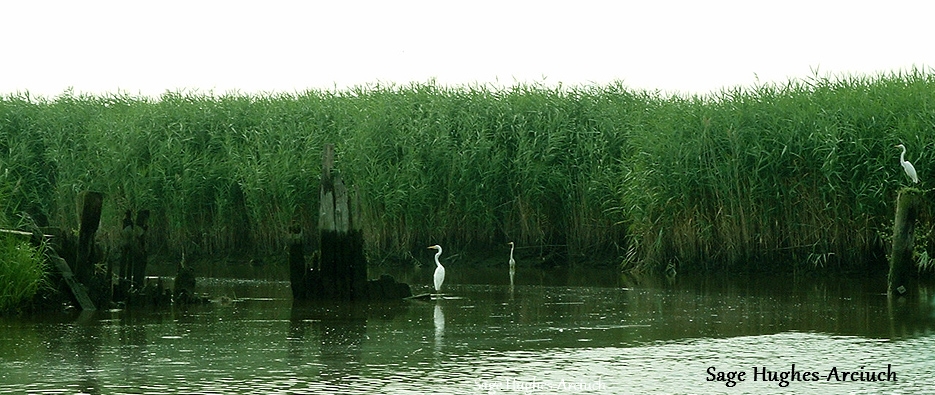
28 Jul Beauty In The Breakdown
Caught, between the roar of traffic and the hum of 787s that fly overhead, the Meadowlands sit like an oasis in a desert of tar. Made up of mostly salt water estuary’s and miles of gold and green vegetation, a Darwinian like society struggles for survival unnoticed amid power lines, planes, and preoccupied passerby’s.
New to the area, it takes me awhile to adjust to the contrast between the peaceful natural beauty that is an arms length away and the overwhelming ugliness of invading highways, cityscape, and man made chaos that lurks nearby. But every so often, a lull on the highway allows me to hear the lapping of the dark and dreary waters against the dirt shore, and the whisper of the wind as it pushes its way through the tall reeds.
It is in these reeds, known as phragmites, that sprout out of the brackish waters and murky mud, winding their way along the NJ Turnpike and riverbeds, that I find a beauty that reminds me of the golden wheat fields of the Midwest. Phragmites loom over both vegetation and humans who seek solace in the silence of the wetlands, creating a natural maze to lose oneself in. While the phragmite reed has been considered invasive due to the acid it releases into the soil, which kills other plant life, the reed seems to fit perfectly in the struggling ecosystem.
Phragmites follow the footsteps of the men who have come before, breaking and bullying the land, taking from it what it needs, and leaving behind an altered habitat for those that remain. One cannot blame the reed, anymore than they can blame the fresh waters for soiling themselves with salt and soot, this is the land they were left with, and they are simply trying to survive.
If the invasive reeds, the green grassy hills, and calmly lapping waters are taken at face value, the wetlands are nothing more than a lovely sanctuary to escape to. Yet it is the secrets, which lie beneath the soil, under the rolling knolls, within the whispers of the wind that draws true environmentalists to the endangered land.
Nearly 20,000 years ago the Wisconsin Glacier began to melt in the region that stretches from modern day Hackensack to Perth Amboy leaving behind a deep freshwater lake, known as Hackensack Glacier Lake. Eventually the fresh water lake would breech and meet rising sea levels, leaving behind brackish waters that wound through deeply forested land made up of mostly American larch and black spruce. If left alone, perhaps the 30 square mile area that currently consists of golden reeds and polluted rivers would have remained populated by the blue-green pines, but finding resources in the fertile soil, man slowly began the breakdown of the beauty.
Lush vegetation, winding rivers, and the home of many animals would eventually be turned into a regional garbage dump. For nearly thirty years, garbage trucks and railroad cars would unload trash from countless municipalities, leaving behind about 34 dumpsites. Eventually the Hackensack Meadowlands Development Commission was created to regulate and stop the dumping, however by this time much of the land had been devoured by developers, and turned into warehouses, hotels, and the present day Meadowlands Sports Complex.
When walking along the wooden planks that create an escape route into the waterways and phragmites maze, one often catches a glimpse of the destruction that is still subtly occurring to the protected area. A silver Mylar happy birthday balloon, deflated and lapping between the rocks, begs for a young boy to return to reclaim it. Aluminum soda cans, remains of unwrapped candy bars, Styrofoam coffee cups, all crouch in the cocoa colored soil, careful to not corrupt the landscape that rallies for resurrection.
Despite the silence being shattered by the sounds of speeding cars, and the landscape being sliced by the tall steel structures that send power to the masses, I believe there is still hope for the Meadowlands. Like the land, that has been molded and mauled by man, we too, as people, are malleable; we can still change our ways. And so, as I walk away from the golden grasses I whisper a prayer for the land, for the plants and the people rooted firmly to it. I turn back one last time, and watch as the wind whistles through the phragmites, bowing their head in thanks.
 Mali Woods-Drake graduated as a writing major from Bloomfield College. She is currently living, writing and fighting for peace and justice issues in Los Angeles.
Mali Woods-Drake graduated as a writing major from Bloomfield College. She is currently living, writing and fighting for peace and justice issues in Los Angeles.



Sorry, the comment form is closed at this time.